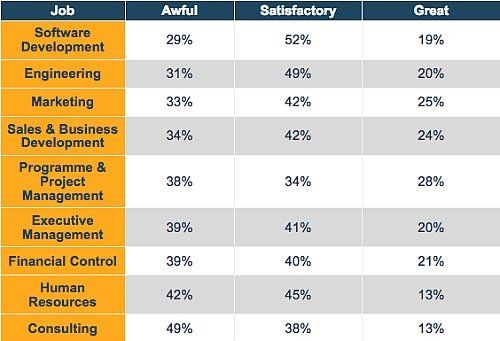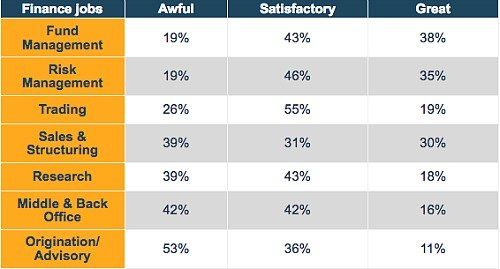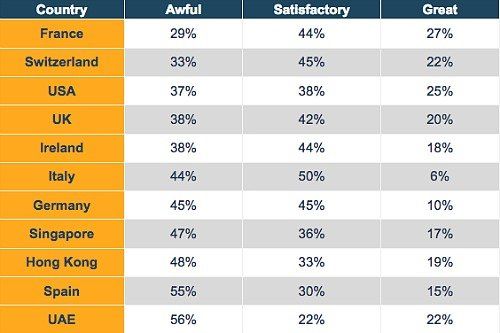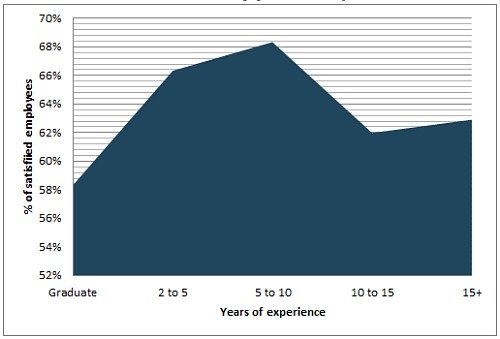Which Are the Jobs in Banking With the Best Work-Life Balance?
Financial centers such as Hong Kong and Singapore are at the bottom of the table of work-life balance. While these locations offer top salaries to employees, they expect a high commitment in return.
In its latest study, the salary-benchmarking site Emolument.com asked 1,360 professionals how they feel about their work-life balance: engineering and IT workers are much happier with their work-life balance compared to other respondents. Location, gender, and seniority level also have a major impact on work-life balance.
Work-Life Balance by Job
Engineers and software developers have it figured out: 71 percent of them consider their work-life balance to be either great or satisfactory. These highly sought-after employees are often able to negotiate perks such as unlimited holidays, flexible hours or days working from home. Not being in a client-facing role, these jobs do not demand set hours at a desk.
Rarely in Control
Consultants are notorious for working long hours, and unsurprisingly are the most unhappy: 49 percent consider their work-life balance to be awful. At their clients' beck and call, they are rarely in control of their working location and hours.
«While the term 'work-life balance' has been touted by large corporations for years, it has finally become a key factor choosing a career,» Alice Leguay, Co-founder and COO at Emolument.com said.
Zoom in on Finance Jobs
Sell-side versus buy-side. An overwhelming 81 percent of fund managers find their work-life balance either great or satisfactory. Fund managers are clients to sell-side professionals (traders, institutional sales, research analysts working at banks), and therefore able to dictate their own timetables, not bound to be in before clients are and markets open.
And while they can usually leave at a reasonable hour as markets close, fund managers can also be somewhat flexible in their working arrangements, being in a less pressurised client-driven environment compared to their sell-side counterparts.
Highly Time-Sensitive Manner
Middle and back office: a rough deal. While only earning a fraction as front office staff, middle and back office professionals are under pressure from traders and salespeople to deliver impeccable outputs in a highly time-sensitive manner. They are more often blamed and rarely congratulated by their front office teams, on top of which they tend to work long hours, tidying up transactions and troubleshoot long after traders have gone home.
M&A and work-life balance do not agree: No surprises there as working weeks can equate to over 100 hours in the office. Hopefully they find some solace is being some of the best paid professionals in the financial sector.
Work-Life Balance by Country
La vie est belle : France tops the rankings with 71 percent of its workers satisfied by their work-life balance. 5 weeks holidays and 35 hours working week go some way to explaining their enthusiasm, though many have forsaken the 35 hour week, and leaving before 7.30 pm can be perceived as 'going home early'.
High salaries, high demands : countries such as Hong Kong, Singapore and UAE are at the bottom of the table (56 percent of UAE workers think their work-life balance is awful). While these locations offer top salaries to expatriate employees, they expect a high commitment in return.
Work-Life Balance by Gender
A different kind of gender gap : 9 percent more women than men think their work-life balance is awful. With more pressure on women to cover for childcare commitments (sickness, school events), housework and logistics, it is not surprising to see such a gap, as for many pursuing a successful career alongside a fulfilled personal and home life resembles a juggling act.
Work-Life Balance by Years of Experience
Poor start, worse ending : 42 percent of graduates starting their careers believe their work-life balance is awful. As they come to grips with their careers, dissatisfaction decreases to 32 percent, but frustration later creeps up as more experienced professionals rise through the ranks and the breadth of their responsibilities and work commitments limits the time they can enjoy outside the office.
Reason for Quitting
«Upcoming generation Y and Z are certainly expecting more flexibility, less face-time, and rather than having to account for half-day annual leave, attending school plays or meetups, expect to be trusted to do the job on their terms. In some industries, implementing such a shift in perception and practice is still a long way off as client demands in terms of reactivity and timeliness remain unchanged. However, employers understand that dissatisfaction with work-life balance is more and more likely to be a reason for quitting, and that higher pay struggles to compensate for time spent away from family and friends,» Leguay added.






























